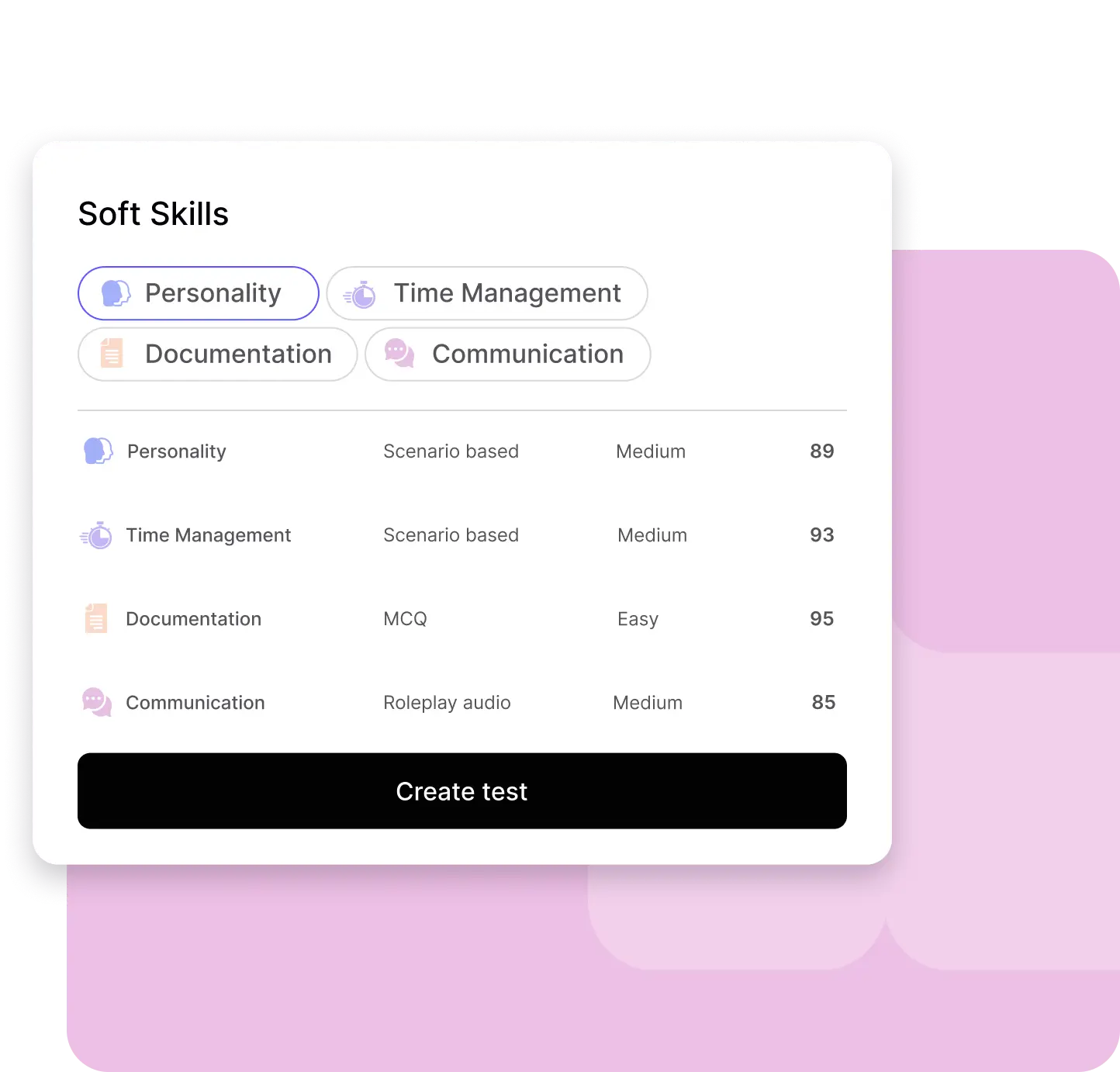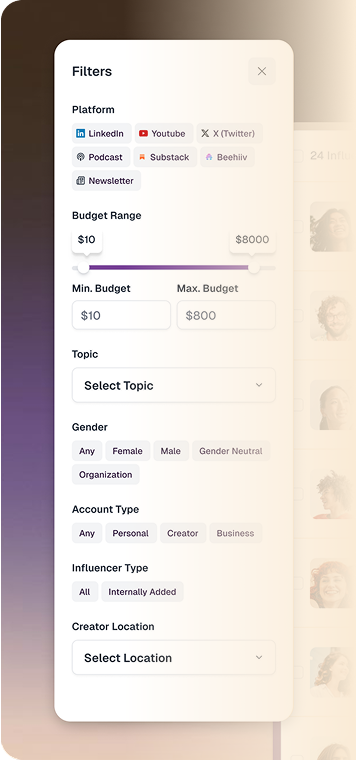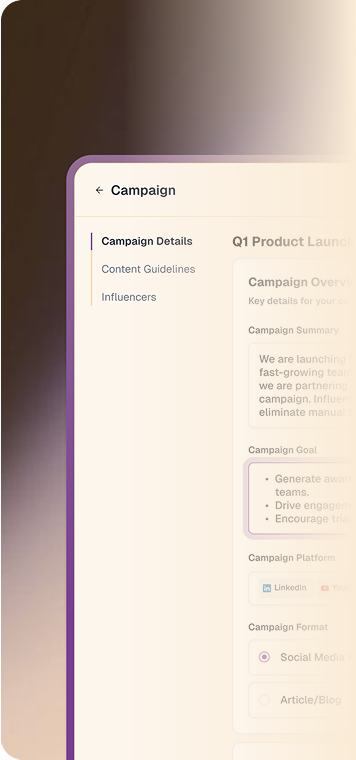Spatial Aptitude Test: Identify Top Technical Talent with 90% Predictive Accuracy
Streamline your technical hiring process with science-backed spatial reasoning assessments that predict job performance in engineering, design, and technical roles.









- Scientifically validated assessment measuring 3D visualization and spatial reasoning abilities
- Objective evaluation of mental rotation, spatial orientation, and pattern recognition skills
- Predictive validity of 85-90% for technical roles requiring spatial intelligence
- Bias-free standardized testing eliminating subjective hiring decisions
- Instant results with detailed competency breakdowns and percentile rankings

Improve Hiring Accuracy by 40%
- Reduce mis-hires in engineering and technical roles through objective spatial ability measurement
- Identify candidates with strong 3D visualization skills essential for CAD, design, and technical problem-solving
- Eliminate guesswork with standardized scoring and industry-specific benchmarks
Reduce Time-to-Hire by 25 Days
- Screen candidates efficiently with 15-30 minute assessments before technical interviews
- Focus interview time on qualified candidates who demonstrate spatial reasoning competency
- Streamline your recruitment pipeline with automated scoring and candidate ranking
Make Data-Driven Hiring Decisions
- Access detailed competency reports showing strengths in mental rotation, spatial memory, and 3D reasoning
- Compare candidates using percentile rankings against relevant technical role benchmarks
- Integrate spatial assessment data with your existing technical evaluation process
Mental Rotation
Evaluates the ability to mentally manipulate and rotate 3D objects to match target orientations. This is essential for roles requiring 3D visualization, such as CAD design, architecture, and engineering.
Spatial Visualization
Measures the capacity to understand and work with 2D representations of 3D objects and structures. This skill is crucial for fields like game development, architectural design, and any role that requires manipulating spatial data.
3D Reasoning
Assesses skills in analyzing spatial relationships, proportions, and geometric transformations. Strong 3D reasoning is vital for tasks such as modeling, system design, and working with complex data structures.
Pattern Recognition
Identifies visual-spatial patterns and completes complex geometric sequences. This competency is essential for roles in data analysis, algorithm design, and software engineering, where identifying patterns in data and systems is key.
Spatial Memory
Measures retention and recall of spatial information, locations, and object orientations. This is important for roles involving navigation, robotics, or any tasks requiring the ability to recall spatial configurations.
Perspective Taking
Evaluates understanding of how objects appear from different viewpoints and spatial positions. This competency is crucial for visual design, product design, and any role that involves interpreting or creating 3D visuals.
Engineers and Architects
Spatial reasoning is key for professionals who work with complex systems, structures, or models. This test helps identify candidates who excel at visualizing and manipulating 3D objects, an essential skill for creating blueprints, prototypes, and innovative designs.
Designers and CAD Specialists
For roles that require working with visual and spatial data, this test evaluates a candidate's ability to understand spatial relationships and use those insights in practical design work, from product design to user interface development.
Data Scientists and Analysts
In roles where understanding complex data relationships and optimizing databases is essential, this test helps identify candidates with strong 3D reasoning and pattern recognition skills, key for working with large datasets and visualizing data structures.
Role-Specific Configuration
Adjust the test content and difficulty levels based on the specific role requirements. For example, increase the complexity for senior engineering or design roles with more advanced 3D reasoning and spatial visualization tasks. Customize the test for specialized fields like architecture, product design, or game development to reflect the exact cognitive demands of the position.
Competency Weighting
Customize scoring parameters to reflect your organization's priorities. For instance, for roles involving heavy CAD use, emphasize mental rotation and spatial visualization. For software engineers or analysts, focus on pattern recognition and abstract reasoning to ensure you're evaluating the right competencies for each role.
Branding and Styling
Create a seamless candidate experience by applying your company’s branding, logo, and color scheme. A white-labeled test experience aligns with your employer brand and ensures consistency throughout your hiring process, from candidate engagement to results delivery.
Critical Thinking Test
Evaluate a candidate’s ability to think logically, analyze complex problems, and make reasoned decisions. This pairing enhances your ability to assess not only spatial aptitude but also problem-solving skills in real-world scenarios.
Technical Skills Test
Assess coding abilities, technical knowledge, and practical problem-solving skills. Combining spatial reasoning with a technical skills test ensures candidates have both the cognitive and technical expertise needed for success in engineering and design roles.
Cognitive Ability Test
Measure general mental agility, pattern recognition, and abstract reasoning. This pairing complements spatial reasoning by providing a broader view of a candidate’s overall intellectual ability and problem-solving capabilities.
Attention to Detail Test
Assess accuracy and the ability to spot discrepancies in work. This pairing ensures that candidates who excel in spatial reasoning also demonstrate the attention to detail needed in tasks like CAD design or 3D modeling.
Why choose HackerEarth’s assessment platform?
automated evaluations, ensuring efficient and objective hiring.
25,000+ questions across 1000+ skills at your disposal
Project type questions to simulate on- the-job problems
Industry's best proctoring solution with automated invigilation
An experience that hiring managers like and developers love
Detailed reports on each candidate’s performance
Data-driven insights to help finetune the hiring funnel
A coding assessment platform that is built for enterprises and loved by everyone
worries, regardless of the size of your organization.







How accurate is the spatial aptitude test for predicting job performance?

Our spatial aptitude test demonstrates 85-90% predictive accuracy for technical roles, with correlation coefficients of 0.6-0.8 with job performance. The assessment is scientifically validated with peer-reviewed research and reliability coefficients above 0.85.
Can the test be customized for our specific technical roles?

Yes, the assessment offers 5 difficulty levels and industry-specific content libraries. You can customize question types, time limits, and scoring algorithms based on your specific engineering, design, or technical role requirements.
How long does implementation take and what support is provided?

Basic implementation takes 24-48 hours with dedicated specialist support. We provide comprehensive training materials, 2-4 hour team training sessions, and 24/7 technical support during implementation and beyond.
Is the spatial aptitude test legally compliant and bias-free?

The assessment is EEOC compliant with demonstrated cross-cultural validity and minimal adverse impact. Our standardized methodology eliminates subjective bias and provides fair evaluation across diverse candidate populations.
What integrations are available with our existing HR systems?

We offer 50+ integrations with major HR platforms including Workday, BambooHR, Greenhouse, and Lever. Our robust APIs enable seamless workflow integration and automated candidate data synchronization.
How do we interpret the results and make hiring decisions?

Each candidate receives a detailed report with percentile rankings, competency breakdowns, and role-specific recommendations. We provide interpretation guides, benchmark data, and suggested cut-off scores based on job analysis.
Related Assessments
Interpersonal Skills Test
Identify developers with exceptional collaboration abilities and communication skills essential for high-performing technical teams. Make informed hiring decisions that go beyond coding expertise.

Design Thinking Test
Evaluate human-centered design skills and innovation mindset with our comprehensive design thinking assessment. Make data-driven hiring decisions that drive product success.

Numerical Ability Test
Streamline your technical hiring with AI-powered numerical assessments that predict job performance with 95% accuracy. Make data-driven hiring decisions for your development and analytics teams.

Organizational Skills Test
Scientifically validated assessments that reveal candidates' ability to manage priorities, optimize workflows, and deliver results under pressure—helping tech companies build high-performing development teams.

Time Management Test
Evaluate candidates' ability to prioritize tasks, meet deadlines, and optimize productivity with our scientifically-validated time management assessment.

Pattern Recognition Test
Scientifically validated cognitive assessment that predicts job performance with 85% accuracy. Streamline your technical hiring process and reduce time-to-hire by 40% with objective, bias-free candidate evaluation.





.webp)
.webp)
.webp)
.svg.svg)
.svg.svg)

.png)





.png)












